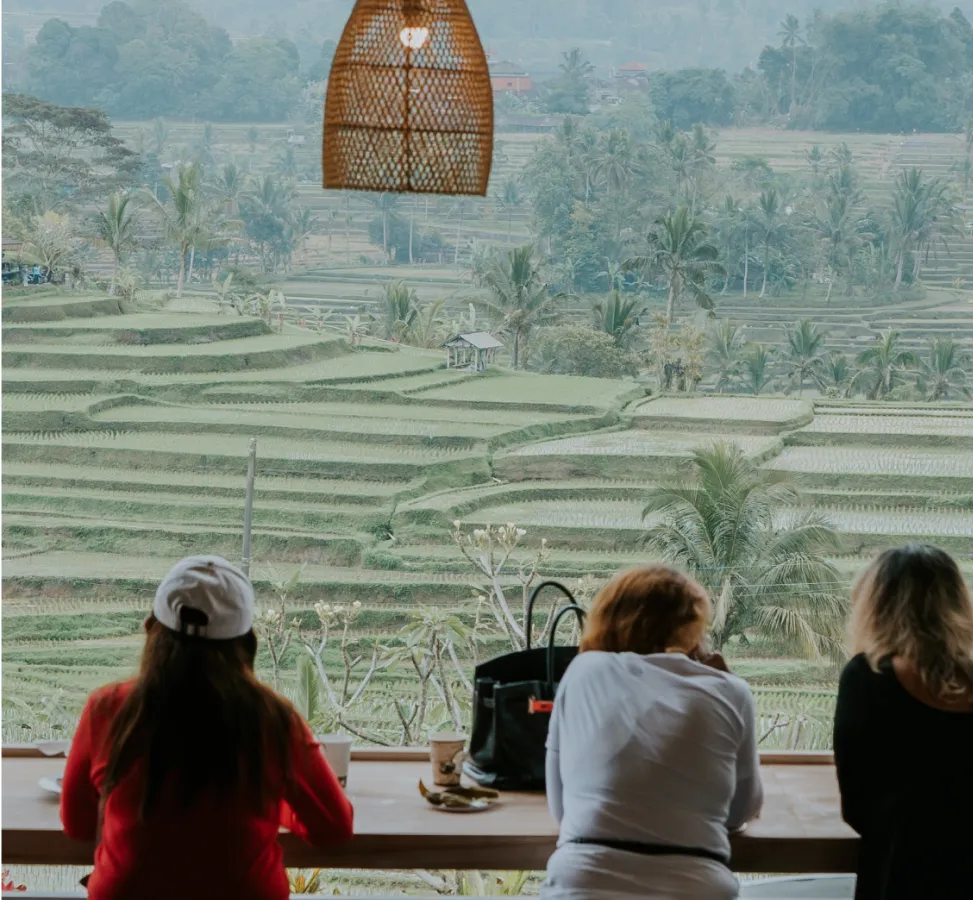Jatiluwih, located in the highlands of Bali’s Tabanan Regency, beautifully showcases Balinese tradition through its ancient rice terraces. These terraces highlight advanced farming methods and serve as a living example of Bali’s culture and spiritual life. The Balinese tradition in Jatiluwih is evident in every contour of the terraces and in every ritual that connects the people to this land.
1. Understanding Balinese Tradition in Jatiluwih
Jatiluwih is famous for its “subak” irrigation system. Subak is a community-managed method of watering crops that has been passed down by local farmers for generations.
But “subak” is more than just farming; it represents a core Balinese philosophy called “Tri Hita Karana,” which highlights the importance of keeping a balance and harmony between people, nature, and the spiritual world.
This system shows how the people of Jatiluwih live out these values, blending environmental care and spiritual respect seamlessly into their everyday lives.
2. Cultural Events and Festivals in Jatiluwih
Jatiluwih comes alive with various cultural events and festivals throughout the year. One of the main highlights is the Jatiluwih Festival, an annual event usually held in June or July, that celebrates the rich farming traditions.
This festival is filled with color and activity, featuring traditional farming demonstrations, dance performances, and music. It offers a chance for both locals and tourists to dive into the culture.
During the festival, visitors can join in rituals, try authentic Balinese dishes, and learn about the traditional way of growing rice. This experience gives everyone a close-up look at the community’s efforts to keep their cultural heritage alive.
3. Architectural and Artistic Heritage
Jatiluwih is well-known for its beautiful landscapes and its rich history in architecture and art. Throughout the rice terraces, there are many small temples and shrines. Each is carefully crafted from local stone and wood. These structures showcase the typical Balinese architecture, which blends artistic design with spiritual purposes.
Local artisans also keep their traditional skills alive by creating textiles and handicrafts. More than that, they pass these techniques down through generations. These handmade items are important to the community. Because, it serves as both a source of income and a way to express their cultural identity.
4. The Importance of Cultural Preservation
Protecting Jatiluwih’s culture and natural environment is very important, which is why it has been recognized as a UNESCO World Heritage site. This status emphasizes the need for tourists to visit in a way that is careful and sustainable. It means you need to respect both the local community and the landscape.
Visitors are encouraged to take eco-friendly tours and support businesses that follow sustainable practices. By doing these things, you help preserve Jatiluwih’s unique culture and enjoy its beautiful scenery responsibly.
5. Immersing in Jatiluwih’s Cultural Richness
Jatiluwih is a way to truly experience Balinese culture. By visiting, you can see how carefully the locals tend their rice fields and even join in a temple ceremony.
These activities help you understand the deep spiritual and cultural beliefs that are a big part of life in Bali. The stunning rice terraces also add to the experience because it provides a gorgeous setting that enhances your cultural journey.
Visiting Jatiluwih goes beyond just seeing its beautiful landscapes. It’s about truly experiencing its culture. It offers a unique blend of agriculture and art, where each festival and ceremony celebrates the rich history and traditions of the area. The Balinese tradition in Jatiluwih is presented in every part of daily life here. By taking part in it, visitors do more than just observe; they help keep this unique cultural scene alive to keep inspiring all who come.


